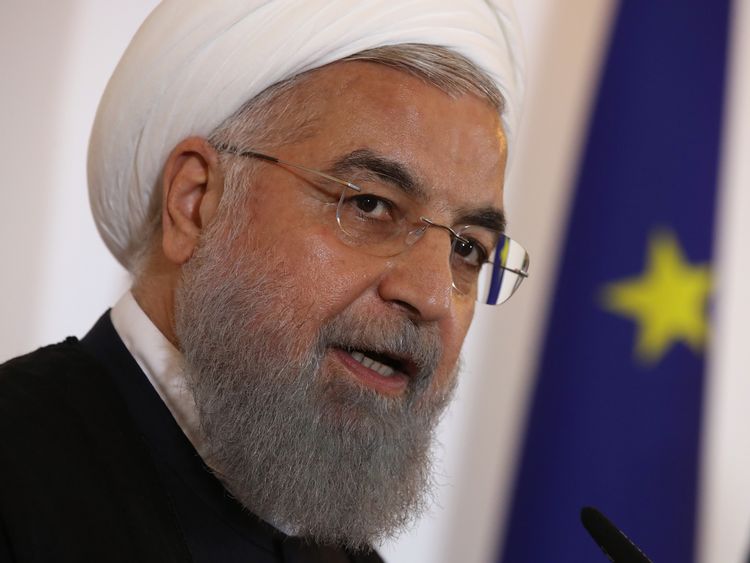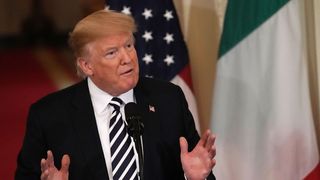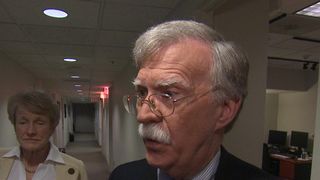The US has reimposed economic sanctions against Iran as President Donald Trump accused the nation of "threatening, destabilising behaviour".
The first set of sanctions target financial transactions that involve US dollars, Iran's automotive sector, the purchase of commercial planes and metals including gold.
Sanctions targeting Iran's oil sector and central bank are to be reimposed in early November.
Iranian President Hassan Rouhani dismissed calls for talks with the US on the eve of the move, adding America "cannot be trusted" and wants to "create chaos in Iran".
The sanctions, which Mr Trump says are aimed at imposing "maximum economic pressure", took effect three months after the US announced it was pulling out of the Iran nuclear deal.
Under the terms of the 2015 accord, seen as a key foreign policy achievement of the Obama administration, sanctions were lifted on Iran in exchange for the freezing of its nuclear programme.
Mr Trump reaffirmed his position on Monday that the agreement was a "horrible, one-sided deal", claiming it left the Iranian government flush with cash used to fuel conflict in the Middle East.
Washington has left the door open for a new agreement, but said the only way for Iran to avert sanctions would be to agree to negotiations over its missile and nuclear programmes.
The US president said the US is urging all nations "to make clear that the Iranian regime faces a choice: either change its threatening, destabilising behaviour and reintegrate with the global economy, or continue down a path of economic isolation".
Mr Rouhani said in a speech broadcast live on state television on Monday: "We are always in favour of diplomacy and talks… but talks needs honesty.

He added: "The US reimposes sanctions on Iran and pulls out of the nuclear deal, and then wants to hold talks with us.
"Trump's call for direct talks is only for domestic consumption in America ahead of elections… and to create chaos in Iran."
The first phase of US sanctions came into effect at one minute after midnight on Tuesday, targeting Iran's access to US banknotes and key industries including cars and carpets.
Renewed US hostility sparked a run on Iran's currency, which lost around half its value after Mr Trump's announcement.
 1:27
1:27It has also added to tensions inside Iran, which has seen days of protests and strikes in multiple towns and cities over water shortages, high prices and wider anger at the political system.
Mr Trump, who broke with European allies when leaving the nuclear deal, warned that those that don't wind down their ties to the Iranian economy "risk severe consequences" under the reimposed sanctions.
European foreign ministers say they "deeply regret" the US' move.
The European Union's foreign policy chief Federica Mogherini and foreign ministers of France, Germany and the United Kingdom insisted on Monday that the 2015 Iran nuclear deal "is working and delivering on its goal" of limiting Iran's nuclear program.
Sky News' US correspondent Hannah Thomas-Peter said: "The withdrawal from the Iran deal and subsequent reinstatement of sanctions was a very popular Trump campaign pledge.
"Critics may be accusing the president of weakening America's position on the world stage, destabilising the region, and handing opportunity to China.
 0:59
0:59"But to Donald Trump's supporters, who found the original Iran deal nothing short of an embarrassment, it is simply common sense not to reward a state sponsor of terror.
"They voted for him in part because he promised a newly muscular 'America first' foreign policy, and with the midterm elections just a few months away, that is what the President is delivering when it comes to Iran.
"The timing is particularly useful in this instance, given the ongoing criticism over his relationship with Russia, and what some have suggested was a naïve willingness to provide Kim Jong Un with a summit in Singapore."
Last Month Mr Trump said he would be willing to meet Mr Rouhani without preconditions to discuss how to improve relations.
Senior Iranian officials and military commanders have rejected his offer of talks as worthless and "a dream", saying his words contradicted his action of reimposing sanctions.
Mr Rouhani urged Mr Trump to "make peace" with Iran on Sunday 22 July.
More from World
A report on Iran's ISNA news agency reported Mr Rouhani as saying: "American must understand well that peace with Iran is the mother of all peace and war with Iran is the mother of all wars."
Mr Trump responded by using Twitter to warn Iran of consequences "the likes of which few throughout history have ever suffered" if it threatens the US again.
The US has reimposed economic sanctions against Iran as President Donald Trump accused the nation of "threatening, destabilising behaviour".
The first set of sanctions target financial transactions that involve US dollars, Iran's automotive sector, the purchase of commercial planes and metals including gold.
Sanctions targeting Iran's oil sector and central bank are to be reimposed in early November.
Iranian President Hassan Rouhani dismissed calls for talks with the US on the eve of the move, adding America "cannot be trusted" and wants to "create chaos in Iran".
The sanctions, which Mr Trump says are aimed at imposing "maximum economic pressure", took effect three months after the US announced it was pulling out of the Iran nuclear deal.
Under the terms of the 2015 accord, seen as a key foreign policy achievement of the Obama administration, sanctions were lifted on Iran in exchange for the freezing of its nuclear programme.
Mr Trump reaffirmed his position on Monday that the agreement was a "horrible, one-sided deal", claiming it left the Iranian government flush with cash used to fuel conflict in the Middle East.
Washington has left the door open for a new agreement, but said the only way for Iran to avert sanctions would be to agree to negotiations over its missile and nuclear programmes.
The US president said the US is urging all nations "to make clear that the Iranian regime faces a choice: either change its threatening, destabilising behaviour and reintegrate with the global economy, or continue down a path of economic isolation".
Mr Rouhani said in a speech broadcast live on state television on Monday: "We are always in favour of diplomacy and talks… but talks needs honesty.

He added: "The US reimposes sanctions on Iran and pulls out of the nuclear deal, and then wants to hold talks with us.
"Trump's call for direct talks is only for domestic consumption in America ahead of elections… and to create chaos in Iran."
The first phase of US sanctions came into effect at one minute after midnight on Tuesday, targeting Iran's access to US banknotes and key industries including cars and carpets.
Renewed US hostility sparked a run on Iran's currency, which lost around half its value after Mr Trump's announcement.
 1:27
1:27It has also added to tensions inside Iran, which has seen days of protests and strikes in multiple towns and cities over water shortages, high prices and wider anger at the political system.
Mr Trump, who broke with European allies when leaving the nuclear deal, warned that those that don't wind down their ties to the Iranian economy "risk severe consequences" under the reimposed sanctions.
European foreign ministers say they "deeply regret" the US' move.
The European Union's foreign policy chief Federica Mogherini and foreign ministers of France, Germany and the United Kingdom insisted on Monday that the 2015 Iran nuclear deal "is working and delivering on its goal" of limiting Iran's nuclear program.
Sky News' US correspondent Hannah Thomas-Peter said: "The withdrawal from the Iran deal and subsequent reinstatement of sanctions was a very popular Trump campaign pledge.
"Critics may be accusing the president of weakening America's position on the world stage, destabilising the region, and handing opportunity to China.
 0:59
0:59"But to Donald Trump's supporters, who found the original Iran deal nothing short of an embarrassment, it is simply common sense not to reward a state sponsor of terror.
"They voted for him in part because he promised a newly muscular 'America first' foreign policy, and with the midterm elections just a few months away, that is what the President is delivering when it comes to Iran.
"The timing is particularly useful in this instance, given the ongoing criticism over his relationship with Russia, and what some have suggested was a naïve willingness to provide Kim Jong Un with a summit in Singapore."
Last Month Mr Trump said he would be willing to meet Mr Rouhani without preconditions to discuss how to improve relations.
Senior Iranian officials and military commanders have rejected his offer of talks as worthless and "a dream", saying his words contradicted his action of reimposing sanctions.
Mr Rouhani urged Mr Trump to "make peace" with Iran on Sunday 22 July.
More from World
A report on Iran's ISNA news agency reported Mr Rouhani as saying: "American must understand well that peace with Iran is the mother of all peace and war with Iran is the mother of all wars."
Mr Trump responded by using Twitter to warn Iran of consequences "the likes of which few throughout history have ever suffered" if it threatens the US again.











